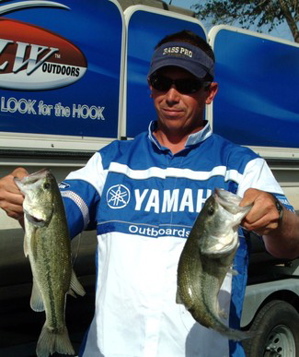 With today’s high price of fuel and other tournament driven expenses, those of us who still want to compete, or even just want to go fishing on a regular basis, are learning how to cut costs.
With today’s high price of fuel and other tournament driven expenses, those of us who still want to compete, or even just want to go fishing on a regular basis, are learning how to cut costs.
Over the last two years I’ve spent 80 to 90 nights a year on the road fishing and away from my home. That is quite a lot, but some professional tournament anglers are on the road twice as much. With this kind of schedule, trying to save a buck or two along the way becomes mandatory.
My single biggest expense on any fishing trip is my fuel bill. There’s no use denying it; Chevron, BP, Arco and the likes eat up a huge part of my tournament budget. Still, my ‘heavy stepping’ right foot can help cut down on some of that cost. I’m no longer towing my boat at 80 mph; now it’s a lot closer to 65 mph. Slowing down just a bit gets me an extra 75 miles to a tank of gas. When you’re driving 1,600 to 2,400 miles on an average roundtrip it turns out to be a big difference without really adding all that much more travel time.
Plan your route, know your route. It is really handy to be able to find the closest rest stops, gas stations or even hospitals in cases of extreme emergencies, if you have a GPS (Global Positioning System) or navigation system. It can save you gas and time if you can easily find your way.
Get your truck or tow vehicle serviced prior to a long road trip. By making sure your truck is in tip-top shape ensures that you not only save time by getting to your destination safely on time, but it can save you big bucks on repair expenses while on the road.
Have your engine, battery, and tires checked. Have them check your brake pads and change oil if it is due. Fill your vehicle’s gas tank to avoid numerous stops, but consider traveling with the boat’s gas tank closer to empty. The additional weight of hauling around gasoline in the boat will certainly add to your tow vehicle’s rate of fuel consumption.
On the bigger lakes, instead of driving your bass boat 40 mph to a spot, it’s best to look for a launch ramp in the area that you expect to fish. Your tow vehicle gets a lot better gas mileage than your boat ever will.
My next biggest expense is lodging. I always get a hotel room for tournament nights, but if weather allows, during pre-fish I will always try to stay for free somewhere. A lot of nights are spent in the confines of the bed of my truck on an air mattress at the launch ramp. Most places will have restrooms and public showers. Spending a couple nights in your truck over the course of the tournament season, and not dropping big dollars on even low budget motels, will add up to hundreds of dollars saved.
Even when I do splurge a bit and get a motel room I have gone to sharing that room with three people instead of two. A third of the hotel bill instead of half means big savings!
When I am out of town, one of the things I hate most is eating out every night for 10 days in a row. If you are eating out three meals a day, you are probably spending $20 to $25 a day in food at minimum. Since I’ve done this for some time now, I’ve figured out how to eat for about $40 per person for 10 days.
That’s right, cost on average - $4 a day. Here’s how I do it. Breakfast is usually some sort of cereal. Trust me on this one; cereal is a lot cheaper than IHOP or the local coffee shop. It can also keep the calorie intake down and makes for a healthier meal.
Lunch is usually some sort of sandwich. Dinner is my favorite meal of the day - BBQ. I travel with a charcoal barbecue and have great meals every night; home cooking on the road!
A whole dinner can be cooked on a barbecue in less than an hour. It might feel a bit weird to be barbecuing in a hotel parking lot at first, but after one or two nights the other people staying there usually go buy their own or are asking to use yours.
On an average day of fishing I will usually consume five to seven liters of water. Keeping yourself hydrated when you’re on the water so much is extremely important to keeping fit and healthy.
If you’re stopping every morning to buy bottled water at $1.50 to $2.00 a liter, you’re wasting your money. At that rate water becomes more expensive than gasoline. I go to the market and buy four two and a half gallon jugs and refill my bottles every night. One of these jugs of water costs about $2.00 on sale. You can get four of those for what I would be spending a day on single liter bottles.
Those are some tips on how to cut some costs on the road. I hope some of the things I am doing will save you some money and allow you more days on the water.


 Advertising
Advertising